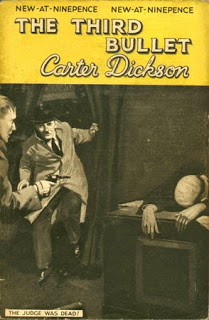This article includes a list of references, related reading, or external links, but its sources remain unclear because it lacks inline citations .(August 2018) |
This article needs additional citations for verification .(June 2024) |
This article needs a plot summary.(December 2025) |
 First edition (UK) | |
| Author | John Dickson Carr |
|---|---|
| Language | English |
| Genre | Mystery, detective, horror novel |
| Publisher | Hodder & Stoughton (UK) Harper (USA) |
Publication date | 1937 |
| Publication place | United States |
| Media type | Print (hardback & paperback) |
| Pages | 128 |
The Third Bullet is a novel by Carter Dickson (pseudonym of John Dickson Carr), first published in the United Kingdom in 1937.
This novel is a "whodunit" and a locked-room mystery.
The two regular detectives of the author, Gideon Fell and Henry Merrivale, do not appear in this novel.